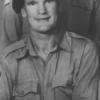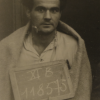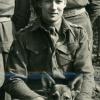Laurie as we all knew him, was born on 30 April 1923, the second youngest of nine children. One of his earliest memories was of going with his father to Chapel Street market to wait for it to close so they could collect left over or discarded fruit and vegetables to take home to feed the family. Young Laurie had the remarkable gift of being able to mimic almost any bird, his blackbird was a joy to hear and they always sang back to him. He earnt extra pennies in the big Pet Shop in Brick Lane whistling to the caged birds and making them sing, which helped bring in customers. As a young teenager, Laurie loved horses and often cadged rides on the working horses when they were led back to their stables in the evening. He also enjoyed cycling and would often cycle to Southend and back with his mates sleeping rough as part of the adventure. On leaving school, he took many jobs, including being a bookies runner.
At sixteen he wanted to join the army and went to the recruitment office that had been set up in the street. He was told he was too young so he went away for an hour or two, came back and saw the same recruitment officer, this time adding a year to his age and he was in. Laurie did his basic training with the Royal Norfolk then on to The Lancers and when he heard of the newly formed Parachute Regiment he applied to be transferred and after rigorous training he became one of the 9th Battalion, 3rd Brigade, 6th Airborne.
In the early hours of June 6th, 1944, D. Day the 9th Battalion were parachuted in to Normandy, the objective to take out the Merville Battery so the British Troops could land safely on Sword Beach. Unfortunately, due to heavy enemy fire many of the planes were off course and much of the equipment and many of the men were scattered as much as fifty miles away from the Drop Zone some in deep water marsh. Of the 650 men only about 150 made it to the Drop Zone. Despite being so undermanned they had to attack the heavily defended Battery. Luckily the enemy was caught unaware, but it was still a fierce battle, only 80 of the 9th Battalion came away and some of these were wounded. They regrouped with many of the men that had been scattered and soon there followed fierce hand to hand fighting at the brick yard and at the Chateau St. Come where they joined up with more troops. There were many skirmishes that went on for days. They arrived at Dougley Ponte-Vec railway station and dug in. Intelligence had informed them that the enemy was several miles away but Laurie always had this sixth sense and he was convinced they were much closer. Laurie as a 21-year-old queried it but was not listened to. When the new latrine buckets were delivered, Laurie put one on his head and marched up and down shouting rude remarks about Hitler, there was a rat a tat tat of gun fire that luckily missed Laurie and yes, the enemy was much closer than they thought. From that day on Laurie’s army nickname was “Bucket”.
After many weeks in Normandy the 9th were flown back to England to regroup and prepare for the next mission to reinforce the Americans in the Ardennes. The Battle of the Bulge. The weather was too bad for them to parachute in so they went across the channel and drove in lorries into the thick forests of the Ardennes, where the temperature hardly ever rose above 20 degrees below and the snow up to six feet deep. After six weeks, somehow the lost ground was retaken. With the battle over the 9th were once more sent back to prepare for the next mission, the crossing of the Rhine, scheduled for the 29th March. The 9th were dropped over the Rhine in advance to prepare the way for the main advance… From there they marched and fought their way across country and through towns including fierce street fighting in Graven, until they finally reached Wismar on the Baltic. By then the war in Germany was nearly over and so they were shipped to India to commence “Jungle” training ready to fight the Japanese. Japan surrendered while they were still training, so they were left at a loose end for several weeks. Laurie and his friends took time out to explore. The remainder of the 9th were finally shipped home to England and were disbanded. Laurie stayed in the Para’s and was stationed in Germany for a while where he learnt to ride properly having lessons from the late great horseman Count Radzianko. Laurie always loved horses and dogs and wherever he was afterwards he usually managed to find a horse to ride. Laurie saw action in the middle east, Palestine, Egypt, Suez and Cyprus. Many of which were “Special Operations”. Laurie worked his way up to be Regimental Sergeant Major of the 1st Battalion and at the time was the youngest R.S.M in the British Army.
In 1962 he left the army as he did not want to just become a pen pusher, as he was never one for paperwork. He decided on a career with horses and spent his pre-vocational course at Colonel Brocklehurst’s polo pony training yard in Holliss Lane, Easebourne learning to care for horses.
It was here that he met Liz who was working there as a groom. They did their courting during one of the worst winters in living memory. By that time, they were helping at a riding school and show pony yard in Woking. Liz and Laurie had escorted twelve children on their ponies to the Boxing Day meet just as the first flakes of snow appeared, soon they were the size of golf balls and the hunt was abandoned and by the time they returned to the stables the snow was up to the smaller pony’s chests. There was still lots of the snow to be seen in the ditches when Liz and Laurie married on the 14th March.
They carried on at the riding school for a few months and then they went to Shropshire as groom whippers in for the South Shropshire Hunt. After several seasons, Laurie and Liz moved to Wiltshire where Laurie looked after and helped train Point to Pointers, while Liz worked free-lance. Then along came the dream job of Head Groom and Manager of millionaire Eric Moller’s famous Jersey Lilies polo team. There with Liz as head girl, he oversaw around thirty polo ponies and Race Horse brood mares and young stock. They would drive large horseboxes of ponies to Cowdray, Windsor and sometimes Cirencester to play. The hours were long but enjoyable.
In the winter, Laurie trained his and Mr Moller’s gun dogs, attending the estate shoots, loading for Mr Moller and working the dogs, famously refusing two open cheques for one of them. When Mr Moller became too old and frail to play polo the sad job of selling all the polo ponies fell to Laurie.
Afterwards Laurie and Liz bought a mobile home and started their own small livery yard. It didn’t make much money to begin with so Laurie took a job as Courier with W.S.Atkins the civil engineers involved with building the M25. The job saw him driving hundreds of miles a week and then helping Liz at the stables on weekends which were now becoming successful, specialising in training and retraining horses and ponies and training ponies for harness.
In 1987 Liz’s mum became unwell and unable to cope so it was decided after seven exhausting but successful years to move down to Harting to live with Liz’s mum. After Laurie retired he soon settled into Harting Life and made many friends. For a while he did a bit of game keeping for the Navy shoot at Torberry and Finchdean, still enjoying working his dog. He continued to ride horses well into his seventies until osteoarthritis made it too painful. He would also spend his time making beautiful walking sticks and holly whips for carriage driving.
Laurie enjoyed classical music, opera and poetry and was a good ballroom dancer doing a very nifty quick step. He also enjoyed his Friday evenings and Sunday lunches in The Ship and when that closed Sunday lunchtimes at the Elsted Inn.
He was a founder member, chairman and later president of the Chichester Branch of the Parachute Regiment Association and for 20 years, chairman of the Harting Branch of the Royal British Legion.
In his early nineties, his osteoarthritis worsened and his sight began to fail and life became more difficult. In January, this year despite having a flu jab he went down with a particularly virulent flu virus and never really recovered. On the 29th March he was taken to St. Richards hospital for two weeks followed by another two weeks in Midhurst Community Hospital, then back to St. Richards for another fortnight.
Laurie spent his last few days in Steep House Nursing Home, where he died on 26th May.
He leaves his wife Liz of 55 years, daughter Yvonne, grandchildren Kelly and (myself) Stephen, as well as Great grandchildren, Lauren, Lucy, Ada, Murphy and Nolan.
Written by Cecil Lawrence's grandson Steve.
Read More




Latest Comments
There are currently no comments for this content.
Add Comment
In order to add comments you must be registered with ParaData.
If you are currently a ParaData member please login.
If you are not currently a ParaData member but wish to get involved please register.